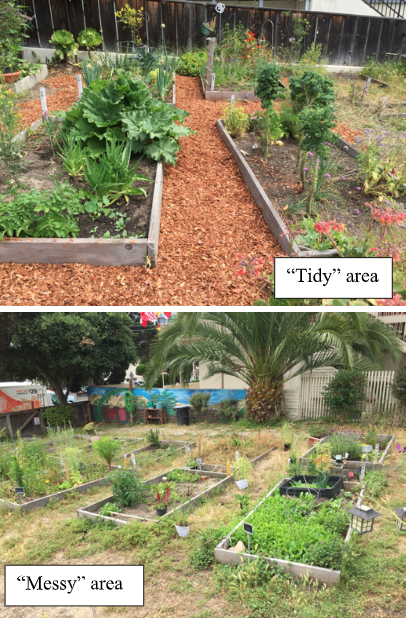Many gardeners strive to keep their growing space tidy for aesthetic reasons, but a study by Stacy Philpott, director of the UC Santa Cruz Center for Agroecology & Sustainable Food Systems (CASFS), and a team of researchers shows that tidy gardens can have impacts on beneficial insects, which are essential to a healthy and productive agroecosystem.
While a growing space with a large presence of weeds and unkempt foliage can appear “messy,” “tidy” gardens often include wood chip mulch, used to suppress weeds in garden pathways or for soil management, which can impact the diversity of beneficial insects in these environments.
“We have done several projects that revealed that heavy use of wood chip mulch is an important factor influencing the diversity and function of gardens,” said Philpott. “For instance, we have found that gardens with more mulch have fewer bee species, but more spiders. We figured this might be due to mulch blocking nest sites for ground-nesting bees, or making it easier for spiders to hide from predators, but we didn’t have the data to know for sure.”
The researchers sought to find out more about the impacts of wood mulch on insect diversity by experimenting in eight gardens across Santa Cruz and Monterey counties. They created “tidy” environments by removing weeds and adding wood chip mulch, and created “messy” environments with potted grass and vetch incorporated to simulate weeds. The team then monitored the changes in natural enemy communities, pest populations, and pest control in both the “tidy” and “messy” areas.
The resulting differences in natural enemies in tidy versus messy garden areas were noticeable after only two weeks—while the addition of mulch did not impact the number of pests or the number of natural enemies, it did cause a shift in which species were present. The researchers also observed that the creation of messy environments resulted in the higher removal of pest eggs, while systems with mulch already present saw lowered egg removal. The team did observe a short term reduction in the presence of aphids in the mulched environments, but by one week later the aphid population rebounded to the amount seen before the mulch was added.
These results are important because altering which species are present in an ecosystem has implications for that environment and may affect yields and the success of gardens, since some natural enemies are more effective at pest control than others.
Although wood chip mulching helps growing spaces look tidy and orderly, there may be some hidden consequences to the beneficial insects in these environments. “Maybe leave some areas of your gardens ‘mulch-free’ and allow some weeds and grass to grow, leave some soil uncovered,” said Philpott. “All of these are important habitat features for insect communities that defend your crops from pests.”

